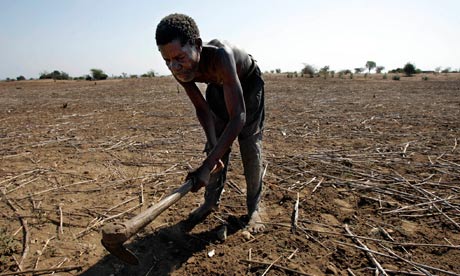New food security alliance is timely for Malawi’s path out of poverty
Published on June 18, 2013 at 1:40 PM by FACE OF MALAWI

Malawi’s membership of the G8’s new alliance is a chance to ‘accelerate investment in agriculture’, says President Joyce Banda. Photograph: Gianluigi Guercia/AFP/Getty Images
Malawi’s government has had to apply a painful remedy to heal economic damage of the past but we’re seeing signs of recovery
At the nutrition for growth summit, held in London this month, Malawi became a member of the G8’s new alliance for food security and nutrition. This is a tremendous opportunity to accelerate my government’s efforts to generate greater investment in agricultural development.
The new alliance is important as my government doesn’t just view agriculture as an essential means to attaining household and national food security; we see it as a business through which our farmers can generate wealth, improve their livelihoods and transform Malawi’s economy. None of this can be achieved without private-sector investment.
When I came to power as Malawi’s president last year, the economy was broken, suffering a crippling crisis brought about by years of mismanagement, as well as long-term structural issues. We were trapped in a vicious cycle of underdevelopment. Clearly, big changes were required; we could not allow the economy to continue to backslide. The choice was not about whether to act, but how?
Faced with the choice of maintaining my predecessor’s policies and trying to effect change through a piecemeal and potentially disorderly adjustment or biting the bullet and implementing a comprehensive package of reforms that would restructure the economy and result in an orderly adjustment, I chose the latter. I’m sure that many leaders in my position (inheriting a presidency mid-term and facing an election within two years) would have chosen the former.
But we couldn’t afford it. Given our perilous economic state, this was no longer a realistic option. I chose to put aside political and electoral considerations to focus on what was required to put Malawi on to a path to long-term sustainable growth. There was nothing new about the prescription required; for years, many experts and commentators (both within and outside Malawi) had called for such action, which would have spared a lot of pain.
My government’s first actions were to attend to the immediate economic crisis by floating and devaluing the exchange rate by 49%, adopting prudent fiscal and monetary policy, including an automatic fuel price adjustment mechanism, and resuming relations with donor partners.
Malawi is one of the poorest countries in the world and, unfortunately, in the short-term these reforms made some of the poorest people even poorer. As someone who has fought for the poor and vulnerable all my life, that has been very difficult for me to live with.
However, my government has tried to do what is possible within limited means to cushion the poor from the harshest impacts. We have combined our economic reforms with social protection policies targeted at the most vulnerable households, aiming to mitigate the impact of our reforms. These include programmes for public works, cash transfers, school feeding and bursaries, and food aid.
One year later, we are experiencing early signs of recovery; the exchange rate is stabilising; fuel is freely available; businesses no longer have to buy foreign currency on the black market to purchase their inputs; production has increased; donors have returned and are again supporting Malawi; and economic growth this year is forecast at 5%. In addition, my government has kept spending down so that there has been no increase in domestic borrowing, and budgetary savings are being allocated to targeted social protection programmes.
The focus of my first year has been very much on repairing the damage of the past – restoring the economy, as well as democracy and good governance. With more of the basic foundations in place, my government is focusing on economic transformation – diversifying the structure of our economy and prioritising projects in key sectors that can lead growth: agriculture, mining, energy, tourism and infrastructure.
Our aim is to restore the confidence of foreign and domestic investors, and attract increasing private investment and remittances, boost foreign exchange flows into the official market, unlock private external credit lines, and facilitate production and stimulate exports.
In my state of the nation address to parliament last month, I thanked Malawians for their patience and resilience. I implored them to stick with me. We are at a crossroads, but the outlook is favourable.
Under our new alliance co-operation framework, more than 20 companies – most of them domestic – announced their intention to invest more than $100m (£63m) in the agricultural sector. These investments will occur across the supply chain, including seed production, crop diversification and expansion of agro-processing facilities. Farmers will benefit from better access to agricultural inputs, employment and training opportunities, as well as finance.
Since taking office, I have been called many names, some of which do not bear repeating; the implication being, I assume, that I am not in control or do not know what I’m doing. But I have a clear vision for my country – one that sees us move beyond poverty to a future rich with hope and opportunities, where Malawians enjoy freedom and dignity, and where they are able to maximise their potential, socially, economically and politically. My vision is about changing what Malawi and Malawians can do.
We need to maintain the course to consolidate and build upon these gains. We have gone too far down the road of transformation to turn back now.

